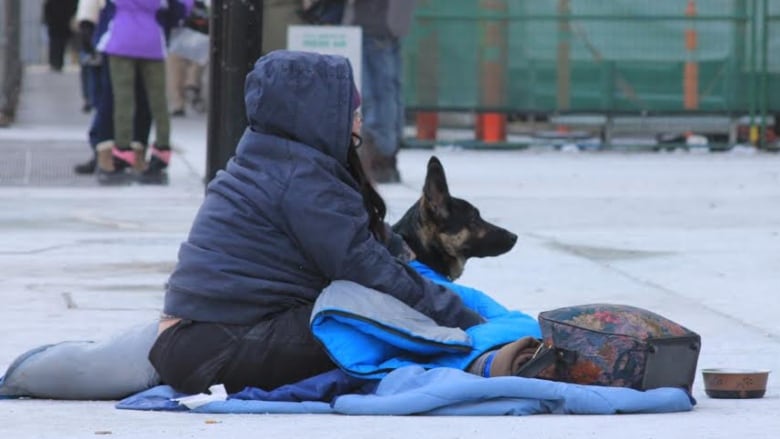Pets of people experiencing homelessness are as well taken care of as any other animals, study indicates
Vet charity, University of Guelph research examined pet medical records from over 1,100 Canadian-U.S. clients

The co-author of a recent North American study into the health of the pets of people experiencing homelessness hopes to challenge the stigma that those animals are not well cared for by their owners.
"I think there has long been a discourse of saying, 'If you can't care for yourself, how can you take care of a pet?'" said Michelle Lem, founder of Community Veterinary Outreach (CVO), who conducted the study with the University of Guelph.
The charity connects people who are experiencing homelessness with health-care services by providing veterinary care to their pets.
"Over the last 18 years that I've been doing this work, that doesn't really match with the reality that many of these pets are well cared for and they experience the same kinds of conditions that other populations of pets [have] in private clinics."
For the study, Lem said, researchers used pet medical records from over 1,100 clients that acceded CVO outreach clinics, which has partnerships and locations across Canada and the U.S.
From those records, the team analyzed each animal's main body condition score, which is an indicator of overall health status, and found the majority of animals were in good health.
"What we saw was the main score was 5.4 out of nine — now an ideal score for cats is five and for dogs is four to five," she said.

The study also analyzed each animal's body system, which includes oral health, skin and muscle, as well as cardiovascular health, and found abnormalities reported in pets owned by those vulnerably housed, typically in oral or digestive systems, were the same conditions reported in pets that accessed private clinics.
"Oral cavity, the skin as well as GI [gastrointestinal] complaints were the most commonly reported abnormalities and again ... those are also the things we see most commonly reported in private practice," she said.
"Where there's differences is access to care and access to preventative veterinary care, access to urgent care or chronic care."
Pets seen as a lifeline, vet technician says
The Humane Society of Kitchener Waterloo and Stratford Perth works with CVO, and has co-ordinated pop-up outreach clinics in the past to bring vet care to homeless or vulnerably housed pet owners.
Stacy Murphy, a registered veterinary technician and clinic co-ordinator with the Perth location, said the animals she has treated are well cared for, as many who experience homelessness often put their pets' needs above their own.
If their animal is ill, they will put the animal ahead of their own needs and they take really good care of them because they are with them 24/7.- Stacy Murphy, veterinary technician, on how people experiencing homelessness treat their pets
"If their animal is ill, they will put the animal ahead of their own needs and they take really good care of them because they are with them 24/7," Murphy said.
Murphy said pets are also a lifeline for people experiencing homelessness and a reason for individuals to care for themselves as well.
"That bond is so strong that they will do anything to keep themselves well in order to keep their pet safe," she said, adding outreach clinics play an important role in keeping those pets in healthy conditions.
Like Lem, Murphy hopes the study will bring more awareness around pet ownership among people with no permanent home.
"The stigma is there, but we're hoping that changes with more studies like this that are showing there is good health among these animals," she said.
You can listen to the full interview with Michelle Lem on The Morning Edition below: